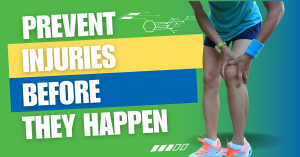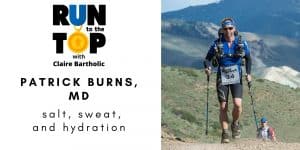You probably know that strength training can help a runner minimize injuries but what about plyometrics or jump training? Do runners really need plyometrics? Wouldn’t that lead to more injuries? Dr. Duane Scotti thinks the opposite is true.
Dr. Duane Scotti, DPT, PhD, OCS is a running physical therapist, run coach, host of the Healthy Runner podcast, and founding owner of SPARK Physical Therapy, and has been a leader in the rehab and running community for over 17 years. He is passionate about helping runners feel strong and confident so they can stay healthy and become lifelong injury free runners!
Dr. Duane truly believes that anyone can run and that all runners should be treated differently as athletes. He is on a mission to change the traditional thinking that running causes “overuse injuries” and you must “take a break” in order to get better. Through run specific training (exercises and running progression) you can build your body to be a strong resilient runner and stay active, stay healthy, and just keep running!
You may think it’s counterintuitive to take time out from your running to work on your jumping, but running is a series of one-legged hops so incorporating some plyometric training into your workout plan to get better at those one-legged hops can dramatically change how well you run and how good you feel while running.
In this episode, Duane explains exactly why plyometrics is important for runners and shares what he thinks are the key muscles runners should focus on, and also gives some great examples of non-jumping strength training exercises that all runners should do to become better and stronger. Some exercises were even new to Coach Claire!
Through the Healthy Runner community, Duane strongly believes living an active lifestyle can help you stay healthy and live a pain free life. At SPARK Physical Therapy, Duane guides his clients in achieving a high-performance active lifestyle through his in-person clinic and virtually anywhere in the world. You could be a runner who aspires to complete your first half marathon, or you could be an experienced marathoner of 30 years. Duane has been the fitness and health support system and the go to resource for coaches, trainers, and runners.
Duane is also honored to be a part of team UCAN as a featured expert dedicated to training strategies and innovation. He has his clients’ best interest in mind as evidenced by constantly creating and sharing new videos, podcast episodes, and blog posts to help runners improve their confidence and strength for running. Through his programs, coaching, and virtual rehab, Duane has successfully helped thousands of runners crush their running goals, hitting personal bests over the years. He has a passion for helping runners of all abilities stay healthy and prevent injuries in order to get back to the workouts and runs they love!
Questions Duane is asked:
5:27 You’re a physical therapist who specializes in runners. Can you tell us a little bit about your own running journey and how you came to focus on runners in your practice?
6:30 You used to dance. What kind of dancing did you do?
7:20 What is plyometrics and why is it good for runners?
9:06 I’m going to play a little devil’s advocate for you here. So if we are jumping all the time, running is a series of hops from one foot to the other, if we’re already jumping all the time, why do we need to do more jumping?
10:03 How do your muscles function differently when you’re running and jumping versus strength training?
11:06 Are plyometrics for every runner?
12:43 Let’s say I am a Level 1 runner. I run three days a week, speed work one day, easy day one day, long run on the weekend, and I’ve never done any plyometrics before. What would your prescription be for me?
14:26 You’re saying that we need to practice landing softly in the gym as well as when we’re running?
15:22 What’s Level 2 plyometric training?
19:32 When I was in super heavy marathon training, the miles piled up, I was running every day, and the last thing that I wanted to do was jump around because I would be so tired. So what do you say to somebody who’s really deep into marathon training and who is balking at a little plyometrics?
22:00 One thing about plyometrics, at least in my experience, is that it ends up being really high cardio. For the most part, I want to get my cardio from running, not from my extra activities so what’s your position on that? How much do you really need or are you a fan of getting your heart rate up in non-running activities?
24:10 At least with other kinds of strength training, a little goes a long way for runners because we’re not trying to get huge and strong and build muscle mass and deadlift a million pounds. We are trying to be not weak for running, so we can get away with a little less strength training than some other kind of athlete in a different sport. So is the same true with plyometrics? Can I just do like five, ten minutes a week and call it good?
26:44 There are some runners, especially older runners and runners who are injury prone, who are afraid that jumping is either too hard or not something that they should do. How do you address that?
29:00 Before plyometrics, what kind of other foundational strength work should we runners be doing every week?
32:10 Let’s talk about examples for each of the muscle groups runners should be focusing on in strength workouts.
39:23 What are some exercises for hamstrings and quads?
43:28 What I’ve been doing for my hamstrings, just to get some feedback to see if I’m doing the right or the wrong thing, is I have a really big exercise ball. So I will lay down on the floor like I’m getting into a glute bridge and I’ll put my heels on the exercise ball and push with my heels the ball away and then pull it back in, and push it in. My hamstrings are on fire when I’m done with that. I can do 10 or 15 and I’m calling for mercy. But you’re saying that’s a little bit different than the Nordic one you recommend?
44:46 One thing you said a little bit earlier that I want to go back to real quick. You talked about some runners being hamstring dominant. I’ve encountered a lot of quad dominant runners. What are your thoughts on that and what’s going on there because most of the people I know who have problems or injuries tend to be really quad dominant?
47:17 When you say we need to work on eccentric exercises, I assume that means you’re a fan of some downhill running because that’s eccentric?
Questions I ask everyone:
48:37 If you could go back and talk to yourself when you started running, what advice would you give yourself?
49:10 What is the greatest gift running has given you?
50:07 Where can listeners connect with you?
Quotes by Duane:
“One of my big principles is we need to train in order to run. So running is not our only form of exercise, our only form of training. We actually have to train in order to run successfully and stay healthy.”
“I am not about, you will see some camp style classes or bigger programs, not going to drop any names, but they go to like failure and they’re doing like 50 box jumps because that’s the WOD that is posted and you’re going to do 50 of them no matter what. No, I’m a big believer in more the quality and how you’re feeling when you’re doing the exercise in order to get the benefit that you want to get from the exercise.”
“One thing about the calf muscle before I forget is endurance. So runners should be able to do 25 single leg heel raises or calf raises.”
Take a Listen on Your Next Run
Want more awesome interviews and advice? Subscribe to our iTunes channel
Mentioned in this podcast:
Runners Connect Winner’s Circle Facebook Community
Follow Duane on:
- Instagram @sparkyourtraining
- YouTube Channel- Subscribe to Get The latest Running Tip
- Join the Healthy Runner Facebook Group
- Send Duane A Facebook Message
- Like the SPARK Physical Therapy Facebook Page
- Blog For Runners
- Inquire About Individualized Running Evaluation (virtual or in person)
- Twitter @scottispark⠀
Listen & Subscribe to the Healthy Runner Podcast:
We really hope you’ve enjoyed this episode of Run to the Top.
The best way you can show your support of the show is to share this podcast with your family and friends and share it on your Facebook, Twitter, or any other social media channel you use.
The more people who know about the podcast and download the episodes, the more I can reach out to and get top running influencers, to bring them on and share their advice, which hopefully makes the show even more enjoyable for you!








